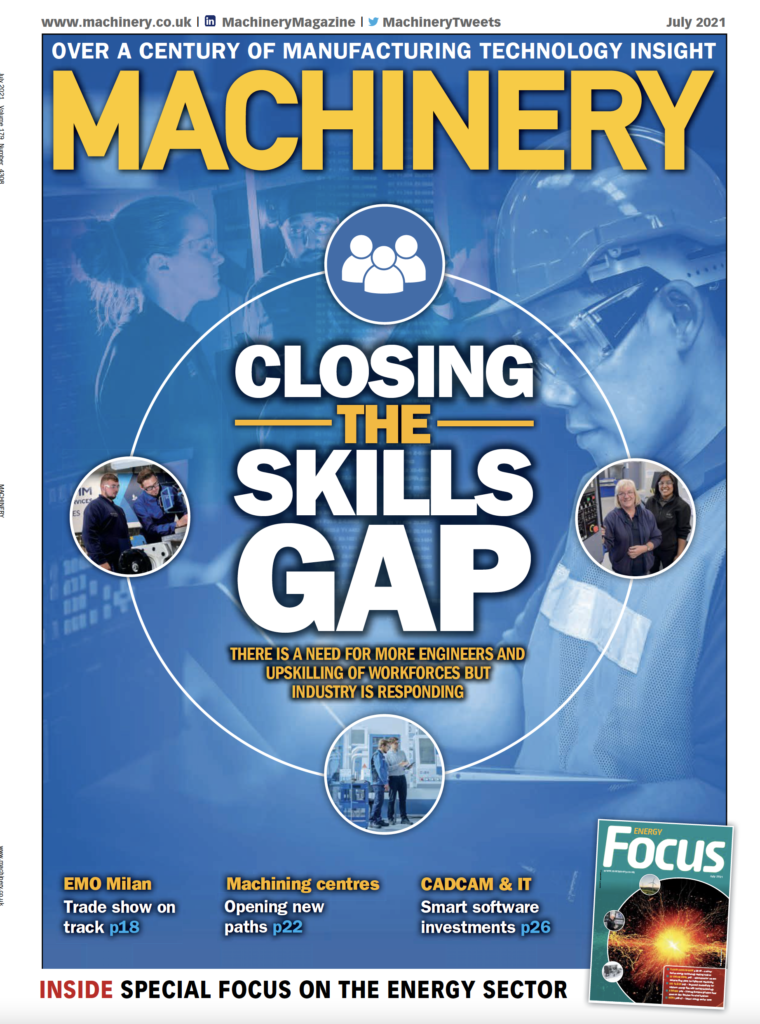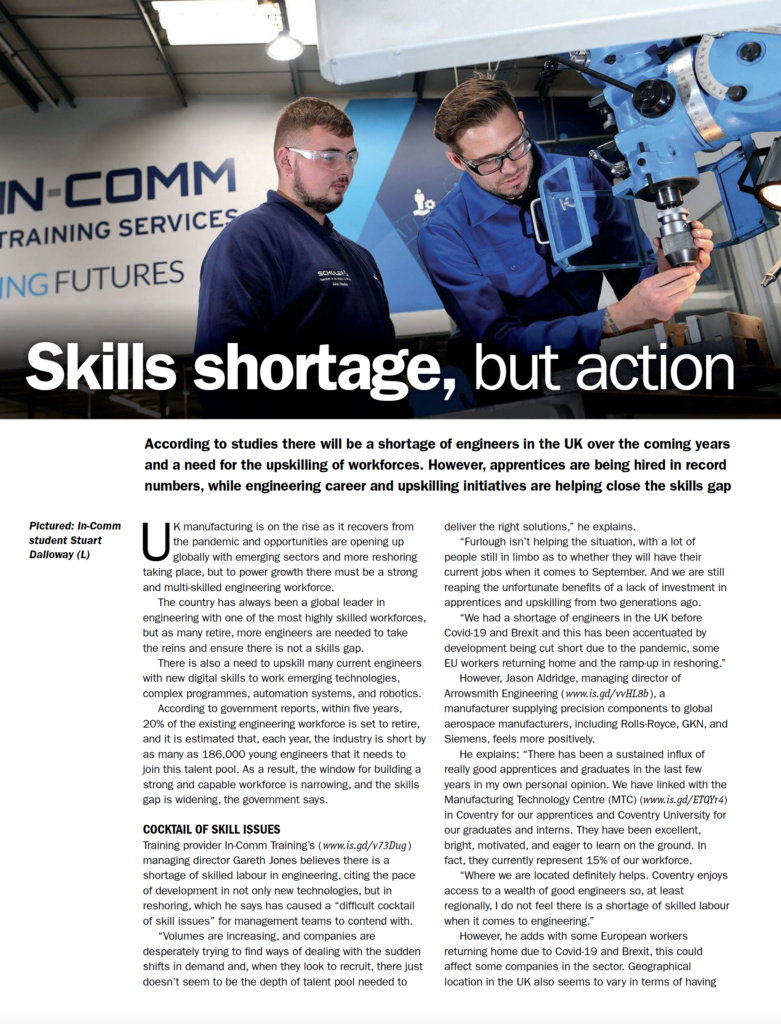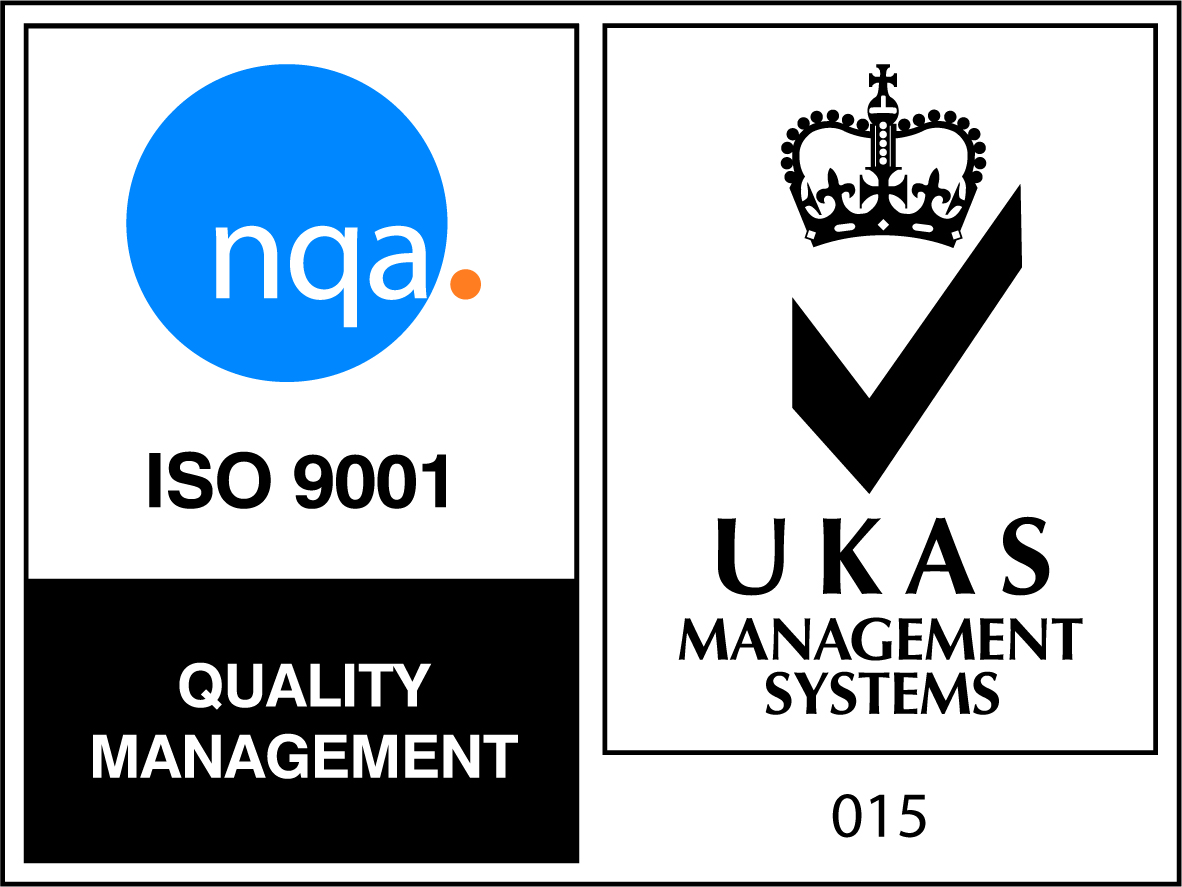Skills shortage, but action – In-Comm appear as the cover story in this months Machinery Magazine
 According to studies there will be a shortage of engineers in the UK over the coming years and a need for the upskilling of workforces. However, apprentices are being hired in record numbers, while engineering career and upskilling initiatives are helping close the skills gap.
According to studies there will be a shortage of engineers in the UK over the coming years and a need for the upskilling of workforces. However, apprentices are being hired in record numbers, while engineering career and upskilling initiatives are helping close the skills gap.
UK manufacturing is on the rise as it recovers from the pandemic and opportunities are opening up globally with emerging sectors and more reshoring taking place, but to power growth there must be a strong and multi-skilled engineering workforce.
The country has always been a global leader in engineering with one of the most highly skilled workforces, but as many retire, more engineers are needed to take the reins and ensure there is not a skills gap.
There is also a need to upskill many current engineers with new digital skills to work emerging technologies, complex programmes, automation systems, and robotics.
According to government reports, within five years, 20% of the existing engineering workforce is set to retire, and it is estimated that, each year, the industry is short by as many as 186,000 young engineers that it needs to join this talent pool. As a result, the window for building a strong and capable workforce is narrowing, and the skills gap is widening, the government says.
COCKTAIL OF SKILL ISSUES
Training provider In-Comm Training’s managing director Gareth Jones believes there is a shortage of skilled labour in engineering, citing the pace of development in not only new technologies, but in reshoring, which he says has caused a “difficult cocktail of skill issues” for management teams to contend with.
“Volumes are increasing, and companies are desperately trying to find ways of dealing with the sudden shifts in demand and, when they look to recruit, there just doesn’t seem to be the depth of talent pool needed to deliver the right solutions,” he explains.
“Furlough isn’t helping the situation, with a lot of people still in limbo as to whether they will have their current jobs when it comes to September. And we are still reaping the unfortunate benefits of a lack of investment in apprentices and upskilling from two generations ago.
“We had a shortage of engineers in the UK before Covid-19 and Brexit and this has been accentuated by development being cut short due to the pandemic, some EU workers returning home and the ramp-up in reshoring.”
However, Jason Aldridge, managing director of Arrowsmith Engineering, a manufacturer supplying precision components to global aerospace manufacturers, including Rolls-Royce, GKN, and Siemens, feels more positively.
 He explains: “There has been a sustained influx of really good apprentices and graduates in the last few years in my own personal opinion. We have linked with the Manufacturing Technology Centre (MTC) in Coventry for our apprentices and Coventry University for our graduates and interns. They have been excellent, bright, motivated, and eager to learn on the ground. In fact, they currently represent 15% of our workforce.
He explains: “There has been a sustained influx of really good apprentices and graduates in the last few years in my own personal opinion. We have linked with the Manufacturing Technology Centre (MTC) in Coventry for our apprentices and Coventry University for our graduates and interns. They have been excellent, bright, motivated, and eager to learn on the ground. In fact, they currently represent 15% of our workforce.
“Where we are located definitely helps. Coventry enjoys access to a wealth of good engineers so, at least regionally, I do not feel there is a shortage of skilled labour when it comes to engineering.”
However, he adds with some European workers returning home due to Covid-19 and Brexit, this could affect some companies in the sector. Geographical location in the UK also seems to vary in terms of having the available skilled engineers.
Aldridge believes Arrowsmith is in a healthy position: “None of our European workers have left, we have a strong, young workforce coming through and, locally, we have a very good crop of middle-aged, skilled engineers.
“We also have a growing number of female apprentices. All we need to do now is to invest in automation and continue to get more women into engineering and we will be world leaders.”
Jones notes there is a larger uptake in engineering craft-based apprenticeships in the build-up to this autumn’s intake, where as previously, it has been more technically focused, including engineering technicians, product designers and project engineers.
Download the full magazine featuring the article here >

